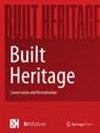Exploring visitors’ visual perception along the spatial sequence in temple heritage spaces by quantitative GIS methods: a case study of the Daming Temple, Yangzhou City, China
Q1 Arts and Humanities
引用次数: 0
Abstract
Abstract The Daming Temple, built during 457–464 C.E., is one of the developing ancient temple heritage spaces located in Yangzhou city, P. R. China. Over the past 60 years, variation in visitors’ spatial perception along the tour routes in the temple has occurred. This research attempts to reveal the changes in visitors’ visual perception along the spatial sequences at 3 different times (i.e., 1962, 1973 and 2022). A quantitative GIS-based method, which includes analysing the distribution of visitors’ spatial preferences and spatial configuration, is proposed. Digital landscape tools and quantitative estimation methods are used, including mapping within Rhinoceros software, the kernel density estimation (KDE) method within ArcGIS software and spatial syntax analysis within DepthMap software. Extracted geodata from 500 photographs of the heritage space taken by volunteer visitors are analysed within the GIS environment. Values of the mean depth (MD) at both levels of visibility and accessibility are calculated within the visibility graph analysis (VGA) model. Comparisons between the visual preferences of the visitors and the spatial configuration along the spatial sequence are conducted. The results indicate that the spatial sequence has a significant impact on visitors’ visual preferences and tour routes. The phenomenon of spatial sequence among dynamic temporal variations and the effects of narrative spaces along the spatial sequence are highlighted and explained, which reveal the relationship between visitors’ geospatial preference and the spatial configuration of the temple. Some suggestions are put forwards for further studies on the revitalisation and management of East Asian ancient temple heritage spaces.基于定量GIS的寺庙遗产空间序列探索游客视觉感知——以扬州市大明寺为例
大明寺建于公元457-464年,是中国扬州市正在发展的古代寺庙遗产空间之一。在过去的60年里,游客在寺庙内沿游览路线的空间感知发生了变化。本研究试图揭示1962年、1973年和2022年三个不同时期游客视觉感知沿空间序列的变化。提出了一种基于gis的游客空间偏好分布和空间配置分析方法。使用数字景观工具和定量估计方法,包括rhino软件中的制图,ArcGIS软件中的核密度估计(KDE)方法和DepthMap软件中的空间语法分析。从500张由志愿游客拍摄的遗产空间照片中提取的地理数据在GIS环境中进行分析。在可见性图分析(VGA)模型中计算可见性和可达性两个级别的平均深度(MD)值。对游客的视觉偏好和沿空间序列的空间配置进行了比较。结果表明,空间序列对游客的视觉偏好和游览路线有显著影响。强调并解释了动态时间变化中的空间序列现象,以及沿着空间序列的叙事空间效应,揭示了游客的地理空间偏好与寺庙空间形态的关系。对东亚古庙遗产空间的活化与管理研究提出了一些建议。
本文章由计算机程序翻译,如有差异,请以英文原文为准。
求助全文
约1分钟内获得全文
求助全文

 求助内容:
求助内容: 应助结果提醒方式:
应助结果提醒方式:


